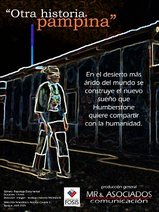Catalambo Albarracín, autor, compositor y folklorista que ha dedicado gran parte de sus esfuerzos a rescatar la música nortina chilena. Fue criado en un campamento salitrero y desde joven se empeñó en dar a conocer la música de su tierra Según el testimonio del folclorista chileno Calatambo Albarracín (1924) estas fiestas transcurrían en términos musicales entre algunas cuecas campesinas traídas en las maletas de los "enganchados sureños", los valses peruanos que rememoraban de algún modo la soberanía de ese país en estas pampas, y la música de pequeños grupos que interpretaban instrumentos de vientos. Me refiero a los aymaras que trabajan en la extracción del salitre. El hombre andino, con zampoñas y sicuris se conecta con los Mallkus o la Pachamama. Al igual que los chinos, los aymaras, eran los grupos marginados y sobre todo discriminados por el resto de la sociedad, incluso por los mismos trabajadores. El folclorista ya citado, menciona que todo el mundo bailaba y cantaba los valses peruanos. Sólo de vez en cuando, un campesino, golpeaba la mesa y empezaba a payar recordando sus paisajes de su tierra natal. Era como una postal llena de árboles, vasijas de barro, en plena pampa. Hay que agregar además que en la pampa salitrera del norte grande, tanto los bolivianos como los peruanos, también celebraban sus fiestas patrias. En ese espacio, todas las nacionalidades, recordaban, por lo menos por un rato, sus patrias.
Catalambo Albarracín, author, composer and folklorista that great part of its efforts has dedicated to rescue Chilean nortina music. He was bred in a salitrero camping and from young person one insisted on presenting music his earth According to the testimony of the Chilean folclorista Calatambo Albarracín (1924) these celebrations passed in musical terms between some cuecas farmers brought in the hooked suitcases of the "sureños ones", valses Peruvian that recalled of some way the sovereignty of that country in these Pampas, and the music of small groups that interpreted wind instruments. I talk about aymaras that they work in the extraction of the saltpeter. The Andean man, with zampoñas and sicuris connects with the Mallkus or the Pachamama. Like the Chinese, aymaras, were the marginalized groups and mainly discriminated by the rest of the society, even by such workers. The folclorista already mentioned, mentions that everybody danced and sang valses Peruvian. Only once in a while, a farmer, struck the table and began to payar remembering his landscapes of his native earth. He was like a postal flood of trees, vasijas of mud, in the heat of Pampas. It is necessary to add in addition that in salitrera Pampas of the great north, as much the Bolivians as the Peruvians, also celebrated their celebrations mother countries. In that space, all the nationalities, remembered, at least by awhile, their mother countries.













No hay comentarios.:
Publicar un comentario